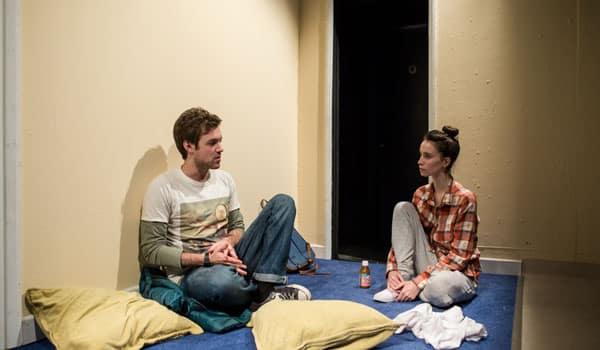Dry Land
Jermyn Street Theatre
05/11/15
4 Stars
Buy Tickets
Dry Land was first performed at New York’s Here Arts Centre a year ago to great acclaim from critics and audiences alike. Damsel Productions have chosen to give the UK premiere as their own first production. Their company aims are to ‘provoke, inspire, shock and.. entertain with true and honest representations of the female experience.’ In these aims they undoubtedly succeed.
Author Ruby Rae Spiegel is a recent Yale graduate, still aged only 22, and the first point to make about this exceptionally mature piece of writing is how credible a portrait of teenage lives and dilemmas it provides. There are really very few plays that capture the combination of brittle and often over asserted exterior certainties that mask inner ambiguities, self-doubt and anguish. And yet this eighty minute drama does exactly that. It shows a gradual transition to adulthood too through graphic but wholly plausible means. All in all this play is a major, though undoubtedly disturbing, achievement.
We find ourselves in the locker room of a swimming pool at a girls’ high school in Florida. With one brief exception this remains the location throughout. Anna Reid’s simple and effective set just provides a block of lockers, a couple of benches in the foreground, and two exits to the pool and showers. The action takes place as the girls prepare for or return from swimming training where the two central characters are highly proficient, and have real future prospects. So the costume too is therefore limited to swimming outfits and layers for the outside world. It is more or less a closed world with a couple of interventions along the way from minor male characters.
Ostensibly this play is about abortion, and much as one does not wish to disclose the plot it is really impossible to discuss the work meaningfully without examining this focus in detail. The evening opens with Amy (Milly Thomas) inviting Ester (Aisha Fabienne Ross) to hit her harder and harder in the stomach in order to induce a miscarriage. The action is punctuated by increasingly desperate attempts to terminate the pregnancy that culminate in a graphic depiction of an induced stillbirth which is both very hard to watch and a remarkable piece of technical acting by Thomas and Ross, who demonstrate a unique bond at this moment of extreme trauma.
I have some reservations about the handling of this theme. It is of course entirely up to the author how she chooses to present this material and there is nothing gratuitous or overly didactic about the writing at any point. I do, however, think it was a missed dramatic opportunity not to allow the characters to explore the possibility of Amy carrying the pregnancy to full term. To say this is not to take sides in the abortion debate merely to express regret that in a situation that is already richly rendered another layer of possibilities was not explored.
There is nothing lacking in the credibility of the characterisations though, which fill out the detail of the lives of the two central players with admirable fine-grained detail. What makes this dramatic debut so memorable is not so much the stark handling of the central theme but the fact that so many aspects of teenage life are touched on and integrated plausibly in a relatively short play.
 So while the headline writers have recorded the audience members who have fainted in performances and the theatres in the USA that have declined to produce this work, what I took away from this experience above all was an admiration for the way the two young women at the heart of the drama quite naturally blended discussion of family alienation, eating disorders, and sexual exploration and ambivalence. Nor was it a portrait of a continuous and harmonious friendship: there was shadow-boxing pettiness and meanness on the one hand and plangent directness and mature loyalties on the other. Neither Amy nor Ester is wholly or even mainly likeable, but they are wholly believable in the way that for another generation, Catcher in the Rye, was wholly credible in all its fine-grained messiness and emotionally anguished confusion.
So while the headline writers have recorded the audience members who have fainted in performances and the theatres in the USA that have declined to produce this work, what I took away from this experience above all was an admiration for the way the two young women at the heart of the drama quite naturally blended discussion of family alienation, eating disorders, and sexual exploration and ambivalence. Nor was it a portrait of a continuous and harmonious friendship: there was shadow-boxing pettiness and meanness on the one hand and plangent directness and mature loyalties on the other. Neither Amy nor Ester is wholly or even mainly likeable, but they are wholly believable in the way that for another generation, Catcher in the Rye, was wholly credible in all its fine-grained messiness and emotionally anguished confusion.
What impressed about the two performances, quite apart from the technical skill and the range of emotions portrayed, was the careful foreshadowing of themes and attributes that only became fully apparent in retrospect. Amy’s angry, swaggering, self-confidence turns out to conceal great fragility and vulnerability, whereas Ester’s apparent shyness and awed reticence in the face of the other girls turns out to mask a toughness and singlemindedness that exceeds her contemporaries altogether.
The other and lesser roles matter too. Crucial to the balance of the play is Reba (Charlotte Hamblin) who altogether lacks the neurotic fierceness of the two main protagonists. At ease in her own skin in a way that they are not she breezes in and out of the play, reducing the intensity of the tensions and providing several moments of daffy and druggy humour. Likewise there is some very delicate acting from Dan Cohen as Victor, whose scene with Ester is an outlier from the main direction of the play, and yet important structurally in providing us with important material on Amy’s self-disdaining personality. While this is self-consciously a play for and about women, his role allows us to see the two central roles from a different and revealing perspective.
My other reservation about the evening lay in the way it ends. This is a case study of the problem posed by the impact of a disproportionate climax. How do you resolve matters when the audience is still reeling from an overwhelmingly difficult and graphic event? Do you wind things down in a dying fall, or as a matter-of-fact depiction of life carrying on much as before, or by an outrageous change of mood as violent as what has just passed in front of our eyes?
The first step the author takes is a very bold one indeed, perhaps allusively reaching out towards the Porter’s scene in Macbeth. As we struggle to take in what we have seen, a janitor (Mark Keegan) comes in to clean up. This is dramatically most effective: the horror deepens in a scene where almost nothing is said at all, leaving the imagination of the audience to do all of the heavy lifting. But it is followed in a final scene in which the mood never really settles and it is not entirely clear where the play finally comes to rest…Ester is moving on, and so is Amy too, but much else between the two of them remains unresolved.
This was one of the most demanding nights I have had in the theatre as reviewer or audience member in a long while, and that was wholly justified by the challenge and revelation of the play. We shall hear more of this author and these actors before long, to be sure. A little bit more give-and-take and opening out of the focus would have benefited the play’s construction, but there is no denying its compelling, unrelenting power.
Dry Land runs at the Jermyn Street Theatre until 21 November 2015

